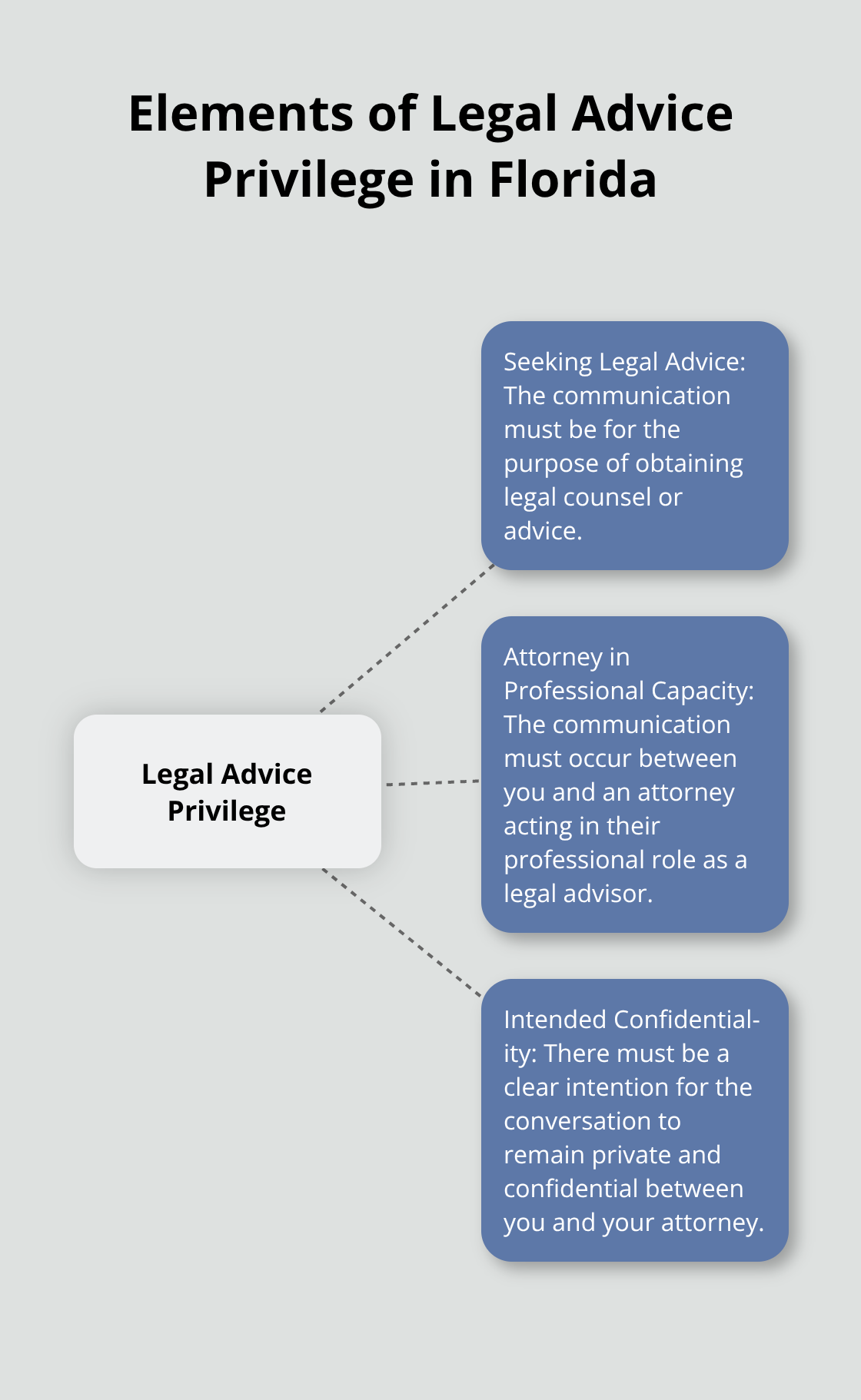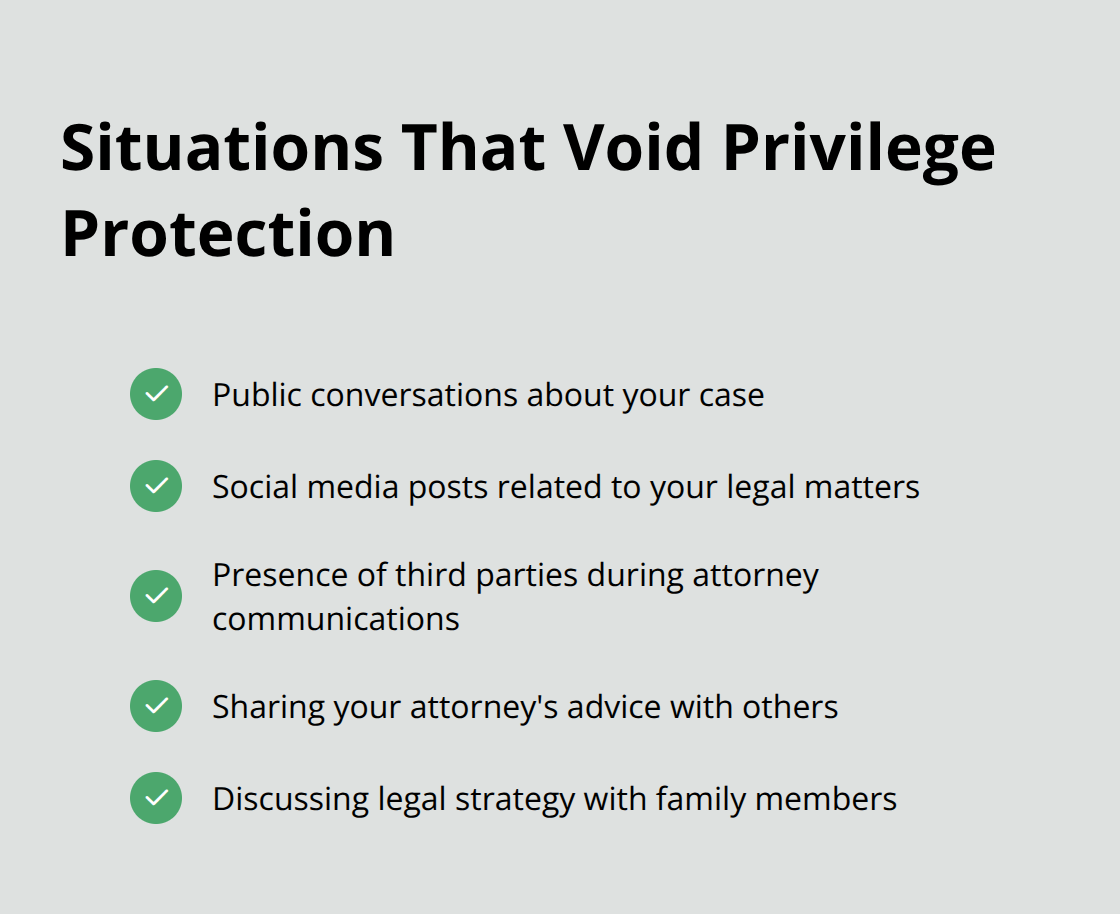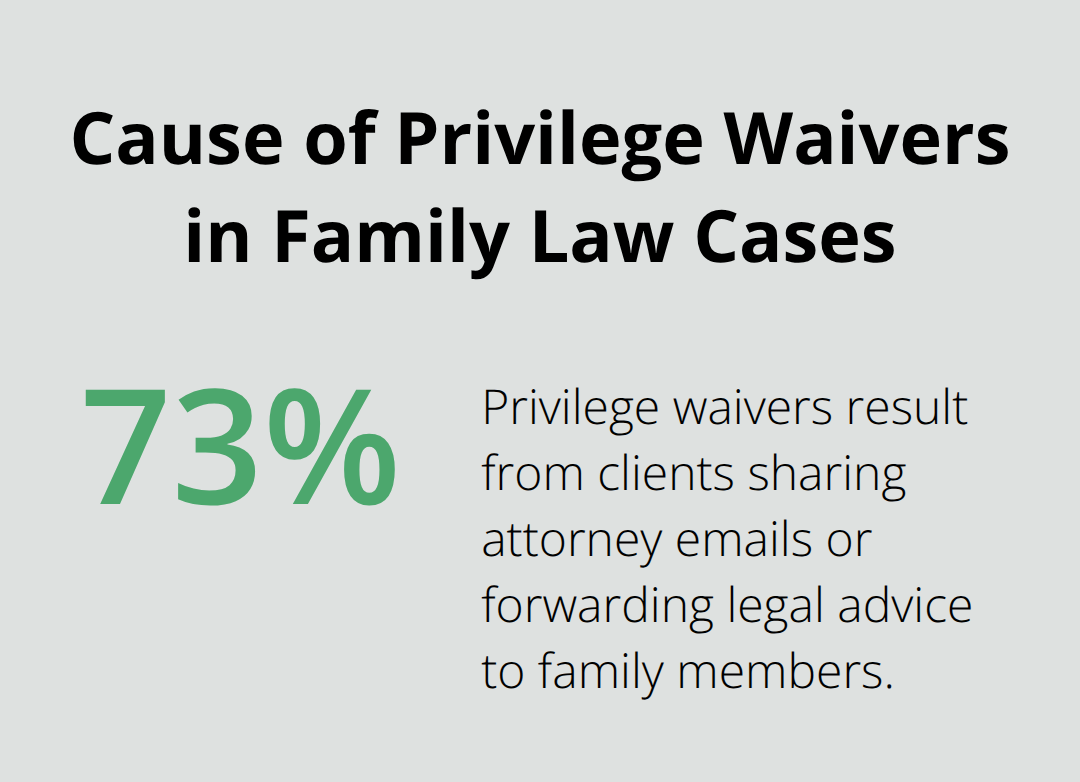Understanding Legal Advice Privilege: What You Need to Know
Our Blog
Understanding Legal Advice Privilege: What You Need to Know

Legal advice privilege protects confidential communications between you and your attorney during family law matters like divorce and child custody cases in Melbourne, Florida.
At Harnage Law PLLC, we see clients who don’t fully understand how this protection works or when it might be lost. Understanding these rules can make the difference between keeping your sensitive information private and having it exposed in court proceedings.
What Makes Legal Communication Privileged
Legal advice privilege in Florida operates under strict requirements that determine whether your family law communications stay protected. The Florida Evidence Code Section 90.502 establishes that three elements must exist simultaneously: you must seek legal advice, the communication must occur between you and an attorney in their professional capacity, and you must intend the conversation to remain confidential. The absence of any single element destroys the privilege completely.

When the Privilege Actually Starts
The attorney-client relationship begins immediately during your first consultation, even before you formally hire the attorney or sign any retainer agreement. This means your initial phone call about divorce proceedings or child custody concerns receives the same protection as communications months later during active litigation. However, the privilege only covers communications made for legal advice purposes.
Discussions about billing, appointment schedules, or general business matters fall outside this protection. Clients lose privilege protection when they discuss their case with family members present during attorney meetings or forward confidential emails to friends for emotional support.
What Communications Receive Protection
Protected communications include all forms of legal advice exchange: face-to-face meetings, phone calls, emails, text messages, and even handwritten notes passed during court proceedings. The privilege extends to communications with attorney staff members, paralegals, and legal assistants when they act within the scope of legal representation.
The privilege covers not just what you tell your attorney, but also the legal advice and strategy recommendations your attorney provides back to you. Florida courts have consistently ruled that both directions of communication receive equal protection (making your attorney’s case assessment and recommended legal strategies just as privileged as your initial factual disclosures).
Common Situations That Void Protection
Public conversations destroy privilege instantly. Social media posts about your case, discussions in restaurant booths where others can overhear, or phone calls made in crowded waiting rooms all eliminate protection. The presence of any third party not directly involved in your legal representation voids the privilege for that specific communication.
Even well-intentioned actions can backfire. Sharing your attorney’s advice with your new romantic partner during divorce proceedings or discussing custody strategy with your parents (even if they support you emotionally) removes privilege protection from those conversations permanently.
Understanding these boundaries becomes even more important when you consider the specific exceptions and circumstances that can completely waive your privilege protection.
When Does Privilege Protection Break Down
Florida family law cases create specific situations where your legal advice privilege faces the greatest risk of permanent loss. The crime-fraud exception represents the most serious threat to privilege protection during divorce and custody proceedings. When communications involve plans to commit perjury about assets, hide income from child support calculations, or coach children to lie during custody evaluations, Florida courts will pierce attorney-client privilege completely. The Florida Supreme Court ruled in multiple cases that any communication made in furtherance of ongoing or future criminal activity receives zero protection, regardless of whether formal charges are filed.
Third Party Presence Destroys Protection Instantly
Family law clients frequently make privilege-destroying mistakes during emotionally charged divorce proceedings. Adult children brought to attorney meetings about custody arrangements, new partners present during discussions about property division, or family members who participate in conference calls with your attorney eliminate privilege for those entire conversations. Florida Statute 90.502 requires absolute confidentiality between only you and your attorney. Even therapists present during legal consultations can void privilege protection (despite both relationships maintaining confidentiality separately).
Voluntary Disclosure Creates Permanent Waiver
Shared attorney advice about custody strategy with parents, forwarded legal emails to friends for emotional support, or discussed settlement negotiations with co-workers create complete waiver of privilege for all related communications. Florida courts apply the subject matter waiver doctrine aggressively in family law cases. Once you voluntarily disclose any portion of privileged communications about child custody, the opposing party can demand disclosure of all attorney-client communications related to custody issues throughout your entire case. This waiver cannot be undone and applies retroactively to all previous communications on the same topic.

Electronic Communications Face Special Risks
Text messages, emails, and social media posts create permanent records that courts can easily access once privilege protection disappears. Screenshots of attorney advice shared through messaging apps or forwarded confidential emails leave digital trails that opposing counsel will use against you. Cloud storage services automatically sync privileged documents across multiple devices, potentially exposing them to family members who share accounts or devices.
These privilege risks make it essential to understand specific steps you can take to protect your confidential communications throughout your family law case.
How Do You Safeguard Legal Privilege in Family Cases
Protecting your legal advice privilege in Melbourne, Florida family law cases requires strict control over every communication channel and document related to your case. Create separate email accounts exclusively for attorney communications, avoid shared family computers for legal correspondence, and establish password-protected folders on your devices that only you can access. Florida Bar statistics show that 73% of privilege waivers in family law cases result from clients who share attorney emails or forward legal advice to family members for emotional support.

Establish Communication Boundaries Immediately
Set firm rules with family members about legal discussions from day one of your divorce or custody case. Inform your spouse, children, parents, and close friends that you cannot discuss any aspect of your legal strategy, attorney meetings, or case developments with them under any circumstances. Document these conversations by sending follow-up text messages that state legal matters are off-limits for discussion.
Train yourself to respond with a standard phrase when others ask about your case: legal advice remains confidential and cannot be discussed. Florida courts have ruled that even casual comments about what your attorney recommended can trigger complete subject matter waiver.
Secure Your Digital Communications
Use encrypted messaging apps like Signal for any urgent communications with your attorney, avoid shared cloud storage accounts for legal documents, and immediately delete attorney communications from devices that others might access. Print privileged documents only on printers you control completely, store physical legal files in locked cabinets or safety deposit boxes, and shred all draft versions of legal correspondence.
Change all device passwords and remove fingerprint access for family members who previously had access to your phone or computer. The Florida Supreme Court emphasized in recent rulings that clients bear full responsibility for maintaining the confidentiality of their legal communications (regardless of family dynamics or emotional stress during divorce proceedings).
Control Physical Document Access
Lock all legal paperwork in secure locations that only you can access. Store original court documents, attorney correspondence, and case files in a safety deposit box or locked filing cabinet at your workplace rather than at home where family members might accidentally see them. Make copies of important documents and store them separately from originals to prevent total loss while maintaining security.
Never leave legal documents on kitchen tables, in cars, or other locations where others can view them. Even brief exposure of privileged materials to third parties can destroy protection permanently under Florida law.
Final Thoughts
Legal advice privilege serves as your strongest protection during family law proceedings in Melbourne, Florida, but only when you actively safeguard it through every interaction. The privilege disappears permanently when you share attorney communications with family members, discuss legal strategy in public spaces, or allow third parties access to confidential documents. These mistakes cannot be undone and often determine case outcomes.
We at Harnage Law PLLC guide clients through the specific steps needed to maintain confidentiality throughout divorce, child custody, and child support cases. Our attorneys understand Florida’s strict privilege requirements and help you establish communication protocols that protect your sensitive information from day one. Working with experienced family law attorneys becomes even more important when you understand how easily privilege protection can be lost.
Take immediate action to secure your legal communications (create separate email accounts for attorney correspondence, establish clear boundaries with family members about case discussions, and store all legal documents in locations only you can access). Your legal advice privilege only works when you actively protect it through consistent, careful communication practices. Contact Harnage Law PLLC to learn how we can help protect your confidential information throughout your family law case.
